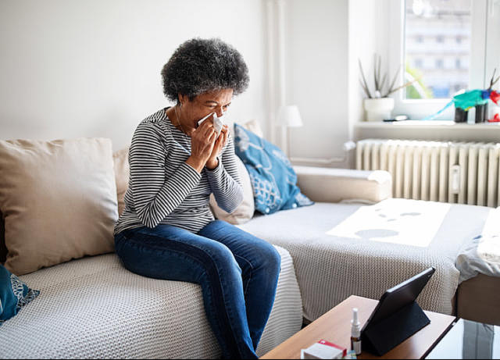COVID-19 is rebounding in various parts of the U.S. Just when we thought we were relatively safe, the virus has reared its ugly head, yet again. But wait, we are now faced with yet another virus with symptoms similar to the coronavirus– respiratory syncytial virus or RSV. It’s most recognized as a childhood illness and leads to an increase in hospitalizations of children in their first or second year of life, but can also be very dangerous for older adults. In a typical year, RSV cases follow the same timeline as the flu – beginning in the fall and hanging around during the colder months when we’re often indoors together.
Experts suspect that relaxed COVID-19 precautions may have led to people having more in-person gatherings and practicing less caution about preventing illness. According to the Centers for Disease Control and Prevention, each year, it is estimated, that between 60,000-160,000 older adults in the United States are hospitalized and 6,000-10,000 die due to RSV infection. African Americans aged 60 and older are at higher risk for hospitalization if stricken with the virus.
What is RSV?
RSV is a highly contagious cold-like virus. It causes infections of the lungs and respiratory tract that often hospitalizes infants and adults more than the common flu per year. The virus can lead to bronchitis and pneumonia. Those with a weakened immune system (immunocompromised) can also be very susceptible to the virus. RSV can also make existing heart and lung conditions worse.
Aditya Shah, MBBS, an infectious disease expert at Mayo Clinic in Rochester, Minnesota, says the impact of RSV infections on older adults will also depend on other underlying conditions, including diabetes, obesity, or kidney disease. “Outcomes are better in those patients that do not have these risk factors,” he says.
Symptoms
RSV can take two to eight days after it enters your body to appear. Symptoms can show up in stages rather than all at once. RSV in adults can often include congestion, or runny nose, and dry cough. They also include a low-grade fever, sore throat, and mild headache. Severe infections may cause symptoms like fever, severe cough, wheezing, rapid or difficult breathing, and a bluish skin color (particularly on the lips and in the nail beds).
Because RSV and COVID-19 are both types of respiratory viruses, they can share similar symptoms. Having RSV may lower immunity and increase the risk of getting COVID-19. And these infections may occur together, which can worsen the severity of COVID-19 illness.
Causes
RSV infection is caused by the virus entering the body through your eyes, nose, or mouth. An infected person is most contagious during the first week or so after infection. The virus spreads easily through air droplets when a person coughs or sneezes near you. Similar to the flu, RSV enters the body when an infected person coughs or sneezes, and their secretions are inhaled, or passed along to others through direct contact i.e. shaking hands, kissing, or touching surfaces. If you touch your mouth, nose, or eyes after touching an infected object, you’re likely to pick up the virus.
Diagnosis
Do you have a cold, flu, COVID? Your doctor will figure it all out. If RSV is suspected, you can expect follow-up lab tests, which may include:
- Rapid RSV antigen test: This is the quickest way to diagnose RSV. A fluid sample is taken from your nose (with a nasal swab or gentle suction) to check for certain proteins called antigens. You can usually get results within an hour.
- Molecular test: For older adults, an RT-PCR test (which also uses a nasal swab) can find a smaller amount, compared to an antigen test. The samples are usually sent to a lab. In certain cases, your doctor might run a respiratory panel test to look for RSV as well as other viruses and bacteria.
There is no preparation needed for RSV testing which should be performed within the first few days of your symptom’s onset.
Treatment
Unlike the flu and COVID, for which there are antiviral treatments, there is no specific treatment for RSV. Instead, patients are advised to take the same measures as with any other respiratory ailment: over-the-counter cold medicine, rest, and drinking plenty of fluids. Hospitalized patients may receive oxygen or additional supports.
We can help prevent the spread of infection with good handwashing and staying home when sick.
Vaccines
There are two RSV vaccines licensed for use in adults aged 60 years and older in the United States: RSVPreF3 (Arexvy, GSK) and RSVpreF (Abrysvo, Pfizer). Ideally, vaccination should occur before the onset of the fall and winter RSV season. Currently, the RSV vaccine series consists of a single dose. Studies are ongoing to determine whether older adults might benefit from receiving additional RSV vaccines in the future.
Need more information about RSV, visit www.rsvandme.com











